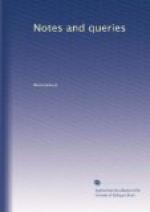Leicester and the reputed Poisoners of his Time (Vol. ii., p. 9.).—“The lady who had lost her hair and her nails,” an account of whom is requested by your correspondent H.C., was Lady Douglas, daughter of William Lord Howard of Effingham, and widow of John Lord Sheffield. Leicester was married to her after the death of his first wife Anne, daughter and heir of Sir John Robsart, and had by her a son, the celebrated Sir Robert Dudley, whose legitimacy, owing to his father’s disowning the marriage with Lady Sheffield, in order to wed Lady Essex, was afterwards the subject of so much contention. On the publication of this latter marriage, Lady Douglas, in order, it is said, to secure herself from any future practices, had, from a dread of being made away with by Leicester, united herself to Sir Edward Stafford, then ambassador in France. Full particulars of this double marriage will be found in Dugdale’s Antiquities of Warwickshire.
The extract from D’Israeli’s Amenities of Literature relates to charges against Leicester, which will be found at large in Leicester’s Commonwealth, written by Parsons the Jesuit,—a work, however, which must be received with great caution, from the author’s well-known enmity to the Earl of Leicester, and his hatred to the Puritans, who were protected by that nobleman’s powerful influence.
W.J.
Havre.
New Edition of Milton (Vol. ii., p. 21.).—The Rev. J. Mitford, as I have understood, is employed upon a new edition of Milton’s works, both prose and verse, to be published by Mr. Pickering. I may mention, by the way, that the sentence from Strada, “Cupido gloriae, quae etiam sapientibus novissima exuitur,” which is quoted by Mr. Mitford on Lycidas, Aldine edition, v. 71. ("Fame, that last infirmity of noble minds"), is borrowed from Tacitus Hist. iv. 6. Compare Athenaeus, xi. 15. Sec. 116. p. 507. d., where Plato is represented as saying:—
“[Greek: Eschaton
ton taes doxaes chitona en to thanato auto
apoduometha.]”
Will you allow me to add, that the quotation from Seneca in Vol. i., p. 427. Of “NOTES AND QUERIES” is from the Nat. Quaest. Proef.
J.E.B. MAYOR.
Marlborough College, June 8.
Christian Captives (Vol. i., p. 441.).—There is an unfortunate hiatus in the accounts of this parish from 1642 to 1679, which prevents my stating positively the amount of the collection here made; but in 1670, Jan 1., there occurs the following:—
“Item. To Mr. Day for
Copying ouer the fower parts that was
gathered in the parish for the Reliefe of Slaues
in Algiears — —
— — 0 2 0”
Mr. Day was curate of Ecclesfield at that time; and in another part of the book there is, in his handwriting, a subscription list, which, though only headed “Colected by hous Row for the ...” is more than probably the copy referred to. From it the totals collected appear to have been,—




